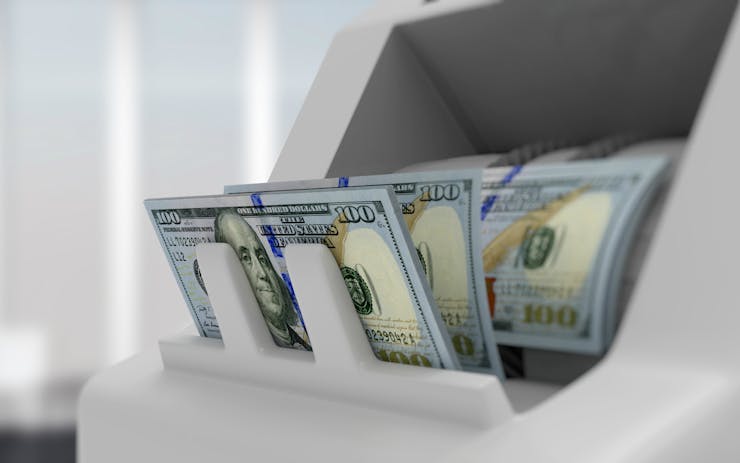Think Tax Day is a headache for the average Joe? Owners of cannabis businesses might get a laugh out of that. In lieu of paying the tax man electronically, state-legal cannabis companies—spurned by banks thanks to federal prohibition—often have to pay a visit to the IRS lugging a fat stack of cash.
It’s not exactly a model of convenience. Literal lump sums have already overwhelmed state tax collectors in places like Oregon, where a cash-heavy $43 million in cannabis tax payments recently threw the Department of Revenue for a loop.
Perhaps that’s why the IRS is setting up cash-counting rooms in two big legal cannabis markets for a weeklong period this month. From April 10 to April 18, in Denver and Seattle only, the agency will offer secure locations for farmers, processors, and dispensary owners to dump out their suitcases and sock drawers.
“I’m happy about anyhting that smoothes relations with the IRS, but practically speaking, this doesn’t really do anything.”
It’s hard to deny the apparent hypocrisy here. You’re a drug lord, the feds seems to say, but we’ll happily take your tax payments! For cannabis businesses looking to make timely payments, however, the counting rooms are a welcome gesture—even if they won’t actually help many people.
“I’m happy about anyhting that smoothes relations with the IRS, but practically speaking, this doesn’t really do anything,” said Todd Arkley, a Seattle-based accountant and board member of The Cannabis Alliance. “It’s nice that the IRS is opening this window, but it’s more of a gesture to me than anything.”
As well intentioned as the new service may be, said attorneys, accountants, and legalization advocates, it does nothing to address the real obstacle facing so many cannabis operations: the difficulty of finding banking services.
Still, for cannabis business owners nervous about their annual pilgrimage to the IRS, the cash-counting rooms could smooth some of the mid-April jitters, said Kristi Kelly, executive director of the Marijuana Industry Group, a Colorado trade association.
“This is an important small step in resolving what is an operational headache for many business owners who don’t have traditional banking,” she told Leafly.
To expedite making tax payments, cannabis businesses often opt to pay with money orders. But those generally max out at $1,000, often making for lengthy, awkward sessions post office attendants and supermarket clerks.
There’s also the matter of feeling like a sitting duck. Operators sometimes bring in money by the bucketload—literally.
“This is a real area of exposure for some folks,” Kelly said. “You can’t go to a secure, private room and process your money. You have to go to a grocery store, or somewhere else very public.”
For security reasons, the IRS isn’t advertising the new service all too loudly. “We don’t want to publicize people bringing in duffel bags of cash into our office,” IRS spokeswoman Karen Connelly told me.
Bear in mind that in Colorado alone, cannabis is a $1 billion dollar industry. And because of federal prohibition, arcane federal tax codes prohibit normal deductions—such as rent, payroll, and advertising—that other businesses can claim. That means legal cannabis ends up being taxed at a higher rate than most other industries.
Obviously this can make for hefty tax bills.
But how many businesses actually need to pay in cash? In Washington and Colorado, along with some other states that have legal cannabis markets, numerous local banks and credit unions do quiet work with state-licensed businesses, a fact not always trumpeted publicly. And recent years have seen a marked uptick in the number of financial institutions willing to handle money from the industry. Arkley says that out of a hundred businesses he works for in Washington state, about three-quarters already use banks.
The situation varies by state. In Colorado, said Denver attorney Rachel K. Gillette, and others, local banking institutions aren’t capable of serving the entire industry.
“Those accounts get shut down all the time,” echoed Vincent Sliwoski, a Portland, OR-based attorney who represents cannabis companies and teaches cannabis courses at Lewis and Clark Law School.
As far as paying state taxes, some legal cannabis states are way ahead of the IRS. They’ve set up secure places for cannabis businesses that don’t use banks or credit unions to pay their taxes in cash.
Why is the IRS opening cash-counting rooms in only Washington and Colorado?
In Oregon, for example, the state government has mandated that its agencies figure out how to collect tax payments from cannabis businesses. “The federal government hasn’t given any such clear instructions to the IRS,” Sliwoski said. “There’s probably a big internal conversation with a lot of confusion around it.”
One nagging question: With adult-use markets now up and running in four states—and with medical marijuana entities operating in dozens more—why is the IRS opening cash-counting rooms in only Washington and Colorado?
The IRS didn’t make itself available for further questions about the new initiative, but Sliwoski guessed that the limited scope is because the cash-counting rooms are part of a pilot program that the agency could expand to other states in the future.
And the program will only do so much for shops in the far-flung corners of legal cannabis states. Some businesses based in in Spokane, Yakima, Telluride, or Aspen will no doubt be bringing in truckloads of cash.
April’s tax season is only part of the problem. If the IRS really wanted to help cannabis businesses pay taxes, said some industry insiders, the agency would make it easier for them to pay payroll and employment taxes. The IRS generally requires those taxes to be submitted both electronically and much more frequently, often making them more of a hassle than income tax payments, Arkley said. “That affects almost all companies.”





